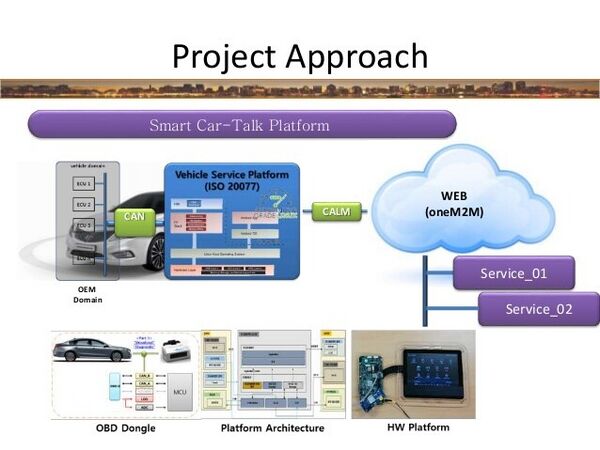Smart Car Talk
| Smart Car Talk | |
|---|---|

| |
 Smart Car Demonstration Project | |
| Team Organizations | Korea Automotive Technology Institute(KATECH) National Information Society Agency(NIA) Korea Intelligent Automotive Parts(KIAPI) Intelligent Transport Society of Korea(ITSK) Renault Samsung Motors LOGIFOCUS Research and Ubiquitous(RnU) Beyless REAKOSYS Radius Mobility Revolution DMCSYS MGoperation WISE automotive Charzin |
| Team Leaders | Sujin Kwag |
| Participating Municipalities | Daegu City (South Korea) |
| Status | Launched |
| Document | None |
Description
Key Deliverables
- Implementation of verification environment for Vehicle-ICT infrastructure connected services, "Smart Car Talk”
- Create new Business models and services
Challenges
- Lack of convergence service between vehicle and ICT industry
- Vertical industrial structure focused on automotive industry
- Limitation of service expansion because of closed service platform
Solutions
- Create new Business model through ICT convergence service
- Specialized horizontal industrial structure to make New industrial ecosystem among enterprises
- Build a foundation for opened service platform
Major Requirements
Implementation of verification environment for Smart Car Talk services
- LAB verification environment
- Testing ground verification environment
- Road verification environment
Smart Car Talk service model development and verification
- Categorizes Into 4 fields (Safety, Driver’s Convenience, Vehicle Management, Infotainment),
- Commercialization of Smart Car Talk Service
- Technology standardization, commercialization support, Publicity activities, Legislation and Revision, and etc.
Construction and Operational Support for "Smart Challenge "integration and verification center
- Smart Car Talk Verification Operation
Performance Targets
| Key Performance Indicators (KPIs) | Measurement Methods |
|---|---|
|
Measurement of real-time face-to-face customer satisfaction survey questions or interviews |
Standards, Replicability, Scalability, and Sustainability
- Requires interoperable oneM2M service platform
- Establishes standardized procedures for ISO 20077.
- The project is not unique to one city or region and can be replicated and scaled up in multiple cities. After verification of service products, the solution can be replicated in one or more cities in any country, if desired
- The system is in progress of its own business model to create a sustainable revenue stream
Cybersecurity and Privacy
Impacts
- Monitoring service as safety observance for school bus driving
- Safe driving for drivers and pedestrians in school
- Promote quality of parcel delivery service and support freight driver’s safe driving
- Convenient use of parking facilities
- Improving safety awareness by sharing incident situation and other local traffic information to vehicles nearby
Demonstration/Deployment
- Phase I Pilot/Demonstration:
Real-time business of verified services in Daegu City, South Korea
- Phase II Deployment:
To be planned for expanding additional services in desired regions